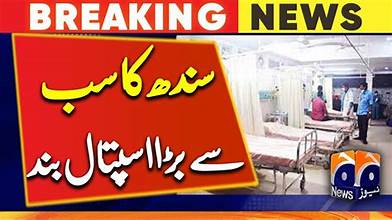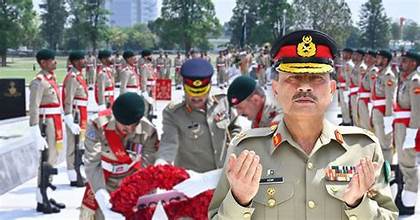Healthcare systems around the world thrive on the commitment and dedication of doctors, nurses, paramedics, and support staff. In Pakistan, particularly in Sindh, the healthcare sector has often been under immense strain due to limited resources, growing patient loads, and inadequate compensation for staff. Recently, the issue has reached a critical stage as Sindh government hospital staff announced their decision to boycott Outpatient Departments (OPDs) in protest against unmet demands for a salary increase.
This looming strike has raised concerns about the healthcare needs of thousands of patients who rely on public hospitals for affordable treatment. It also reflects deeper systemic issues related to compensation, workload, and government policies in Pakistan’s public health sector.
The Core of the Protest
The hospital staff—including doctors, nurses, and paramedics—are demanding a fair pay raise to bring their salaries in line with inflation and the rising cost of living. They argue that while the government has promised increments in the past, implementation has either been delayed or neglected entirely.
Healthcare workers point out that their counterparts in other provinces receive comparatively higher compensation packages. Sindh’s public hospital staff often feel overlooked despite their pivotal role in providing medical care to one of Pakistan’s most populous provinces.
The boycott of OPDs, therefore, is not just about salaries—it is about recognition, respect, and the government’s responsibility to its employees.

Impact on Patients
The decision to suspend OPD services will inevitably hit patients the hardest. In Pakistan, government hospitals are often the only option for millions who cannot afford private healthcare. Every day, thousands of patients visit OPDs for routine check-ups, consultations, diagnostics, and follow-ups.
A boycott means delays in diagnosis and treatment, longer waiting times, and possible worsening of medical conditions for those who cannot seek private care. For individuals with chronic diseases like diabetes, hypertension, or heart conditions, missing routine check-ups could lead to serious health consequences.
Patients from rural areas, who often travel long distances to reach urban hospitals, are especially vulnerable. Their healthcare journey becomes uncertain, and many may be forced to postpone treatment due to financial and logistical hurdles.
Sindh Government Hospital Staff to Boycott OPDs in Protest Over Pay Raise Demands
The Government’s Position
Sindh’s provincial government acknowledges the rising costs faced by healthcare staff but often cites financial constraints as a barrier to implementing large-scale pay hikes. Budgetary pressures, especially in a province with multiple competing needs such as education, infrastructure, and law enforcement, make it challenging to allocate more funds to healthcare salaries.
Government officials argue that negotiations are ongoing and urge staff to refrain from disrupting patient care. However, healthcare unions feel that dialogue without tangible results has dragged on for too long.
The Larger Picture: Healthcare in Crisis
The protest is not an isolated event but part of a larger pattern in Pakistan’s healthcare system. Public hospitals in various provinces have witnessed strikes, walkouts, and protests over similar demands in the past decade.
Common grievances include:
- Low salaries compared to workload
- Lack of timely promotions and career growth
- Poor working conditions with outdated equipment and overcrowded wards
- Limited government investment in healthcare infrastructure
These issues fuel frustration among healthcare professionals, many of whom choose to migrate abroad in search of better pay and working conditions. Pakistan’s already fragile healthcare sector thus suffers from a “brain drain,” leaving fewer doctors and nurses to cater to a growing population.

Ethical Dilemma: Strikes in Healthcare
While healthcare staff have every right to demand fair wages and working conditions, strikes and boycotts raise ethical concerns. Patients who depend on OPDs for life-saving care become collateral damage in the conflict between workers and authorities.
Medical ethics emphasizes the duty of care and prioritizing patients’ health. However, healthcare workers argue that underpaid and overworked staff cannot provide quality care in the long run. They see strikes as a last resort when negotiations fail repeatedly.
Finding a balance between patient welfare and workers’ rights remains one of the most pressing challenges in healthcare systems globally, including in Sindh.
Possible Solutions
Addressing the crisis requires a multi-pronged approach that balances the needs of healthcare staff with the well-being of patients:
- Incremental Salary Adjustments: Instead of waiting for large pay hikes, the government could introduce phased salary increases tied to inflation.
- Transparent Dialogue: Establishing a joint committee of government officials, healthcare union representatives, and financial experts can create accountability and trust in negotiations.
- Better Resource Allocation: Healthcare needs to be prioritized in the provincial budget. Investments in salaries, infrastructure, and equipment would pay long-term dividends.
- Alternative Dispute Mechanisms: Instead of striking, staff could adopt partial boycotts or symbolic protests that do not disrupt essential services, ensuring patient care continues.
- Performance-Based Incentives: Introducing bonuses or allowances for staff working in high-pressure environments could help reduce frustration.
Voices from the Ground
Healthcare staff argue that their demands are not excessive—they simply want parity with other provinces and salaries that reflect the reality of inflation. Nurses, in particular, highlight the immense burden they carry, working long shifts for modest pay.
Patients, on the other hand, sympathize with the staff but feel helpless in the face of OPD boycotts. “We understand doctors deserve fair salaries,” one patient remarked, “but who will treat us when we fall sick? We cannot afford private hospitals.”
This dual perspective underscores the complexity of the issue. Both sides have legitimate concerns, but the current standoff places vulnerable patients in jeopardy.
What Lies Ahead?
If the Sindh government and healthcare staff fail to reach an agreement, the boycott could expand, potentially affecting emergency wards and in-patient services. This would escalate the crisis further and put immense pressure on the provincial administration.
Public trust in government healthcare is already fragile. Extended strikes could push more patients towards private facilities, deepening healthcare inequality in society. Meanwhile, healthcare staff risk losing public sympathy if patients continue to suffer.
Conclusion
The decision of Sindh government hospital staff to boycott OPDs highlights the urgent need for reform in Pakistan’s public healthcare system. While the demand for fair pay is justified, the strike underscores the delicate balance between workers’ rights and patient welfare.
For sustainable solutions, the government must prioritize healthcare funding, honor its commitments to staff, and invest in long-term reforms. Simultaneously, healthcare unions should consider alternative protest methods that do not compromise patient care.
Ultimately, healthcare is the backbone of society. A system that undervalues its staff cannot function effectively, and a society that neglects its patients cannot thrive. The Sindh boycott should serve as a wake-up call for meaningful action before the situation spirals into a full-blown healthcare crisis.



